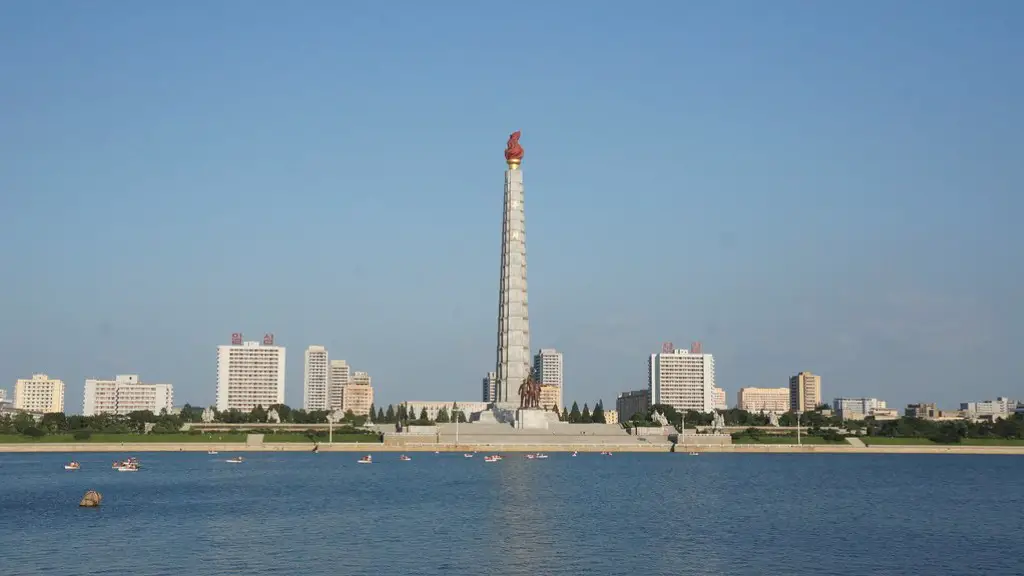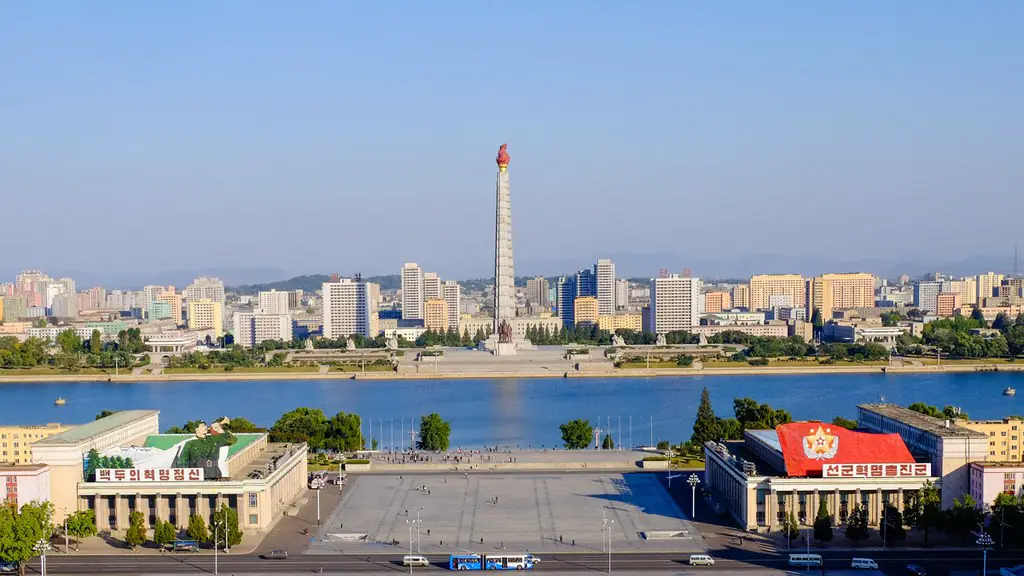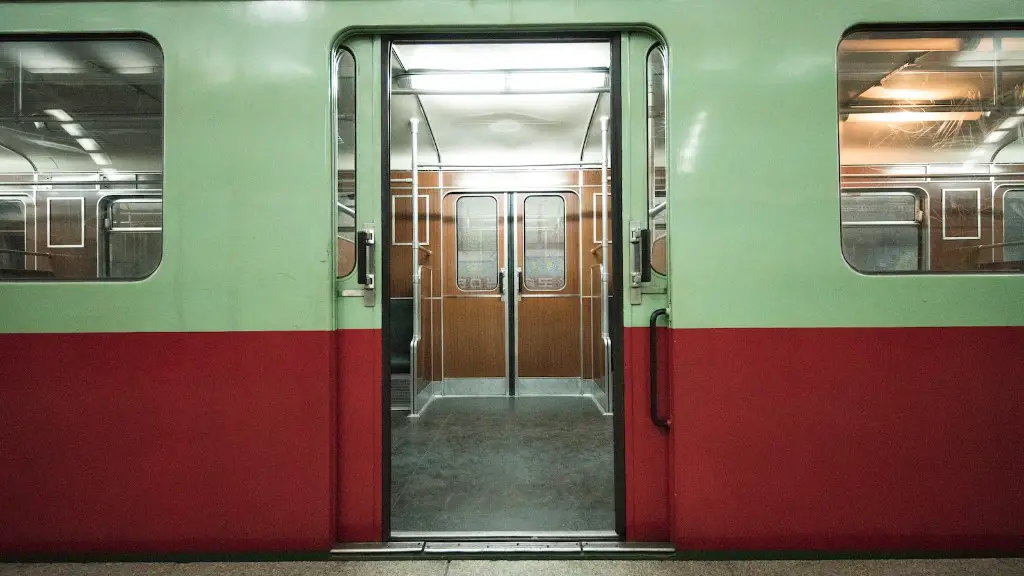Close to the borders of China and South Korea lies the hermit nation of North Korea, a country shrouded in mystery and the last remaining country of the Cold War. It has managed to shut itself off from the rest of the world and outwardly express hostility to most of its neighbors. For these reasons, many are asking the same question: “Why is North Korea the way it is today?”
To answer this question, let’s take a look at the history of the country. North Korea is one of the last surviving Stalinist dictatorships in the world, founded in 1948 by the Great Leader, Kim Il Sung. It was the ideological opposite of South Korea, which was founded the same year and embraced capitalist and democratic ideals. Since the division, North and South have been in constant conflict, culminating in the Korean War of 1950-1953. North Korea has since maintained its tight grip on power, primarily through oppressive tactics of fear, surveillance, and brutal repression.
Today, the North Korean government employs a variety of tactics to keep the nation isolated. The country exports little and restricts the types of media and outside influences that North Koreans are exposed to. The government maintains strict control over every aspect of society, including its citizens’ travel, employment, and access to food. The government also maintains tight control of the economy by tightly rationing resources, restricting economic transactions, and manipulating currency values.
The question still remains: why is the North Korean government so oppressive? Many experts point to the powerful elite at the top of the nation. The ruling Kim family, which has been in power for three generations, has a vested interest in keeping the population in line. The government also works to maintain a sense of nationalism and unity, instilling loyalty and respect in its citizens. Through a combination of propaganda and indoctrination, the government seeks to keep the population in fear that outside forces will invade and destroy them if they don’t remain loyal and obedient.
The way North Korea is today is also the result of a number of external factors. The nation is constantly on guard against its southern neighbor, South Korea, which it views as a puppet of the United States. As well, there are the sanctions imposed by the United Nations and the United States for their nuclear tests and proliferation of weapons of mass destruction. These sanctions severely restrict North Korean access to the global economy, further exacerbating its dire economic situation.
Ultimately, the North Korean government uses fear to keep its citizens in line with its oppressive rule. It relies on isolationism and a sense of national pride to ensure loyalty, while punishing anyone who speaks out against the system. This combination of world-view and tactics have allowed the North Korean government to remain in power despite the many external forces that oppose it.
Political Power
Under the current North Korean leadership, the political power lies heavily in the hands of Kim Jong-un, the family’s third-generation leader. Kim Jong-un is viewed as a god-like figure in the eyes of the North Korean people and has a large amount of influence and power. He is able to override any decision that he does not agree with, and is widely feared by the people. It can be argued that Kim Jong-un’s heavy-handed rule is a significant factor in the way that North Korea is today.
The reality is that the top echelons of North Korean leadership is highly intertwined with the Kim family, and the Kims’ policies. Many of the people in power have close personal and/or familial connections to the Kims. These connections, along with the presence of a figurehead leader, have allowed the North Korean system to stay intact and remain largely unchanged.
Kim Jong-un also wields a high level of control over the media and information that North Koreans are exposed to. He has the power to broadcast state-approved propaganda and limit the amount of foreign news and information that North Koreans are able to access. This further helps to maintain the nation’s isolation and foster loyalty and obedience among the population.
To summarize, Kim Jong-un’s control and influence on the political structure of North Korea has exacerbated the country’s oppressive and isolationist rule. This has enabled the nation to continue on its current path, with the population staying largely under the control of the regime.
Military Might
The North Korean military is a powerful force in and of itself, and holds an immense amount of power over the nation. The North Korean armed forces boast one of the largest numbers of active soldiers in the world. It is estimated that this number is close to 1.2 million in total. The North Korean military also possesses a wide range of weapons and technology, including a nuclear arsenal.
The importance of the military to the North Korean regime cannot be underestimated. The large number of soldiers and the strength of the military contributes to the nation’s feeling of security and strength. This is instrumental in maintaining the power of the regime and preventing external influence from entering the country.
The military is also a key component in the nation’s economy. Despite the fact that North Korea faces economic hardship, the military’s spending is one of the few sources of government income. The large military budget helps to fund the nation’s other activities, such as its nuclear weapons program, and ensures that the North Korean leadership can remain firmly in power.
It is clear that the North Korean military plays a significant role in the nation’s politics and economy. North Korea’s military power is a key component in why the country is the way it is today.
Mass Surveillance
The North Korean government maintains a tight grip on the population by implementing an extensive network of surveillance and informants. This network consists of approximately one informant for every 50-70 citizens. Additionally, the government maintains a massive database of information from its citizens, which is utilized to keep a close tab on the population.
This surveillance system is used to restrict dissent and control the population. It also serves to limit outside influence and prevent the spread of revolutionary ideas. By having such an extensive surveillance system, the North Korean government can ensure that anyone considering speaking out against the regime will face severe repercussions.
The presence of mass surveillance in North Korea is yet another factor contributing to the nation’s oppressive nature. This system of control and fear of punishment prevents the population from gaining any real power or providing any form of challenge to the government, thus enabling the North Korean system to stay in power.
Isolationism
The North Korean government maintains an isolationist policy when it comes to foreign relations. It has refused to recognize the legitimacy of foreign governments, and the nation does not engage in diplomacy with other countries. This is historically seen in the nation’s refusal to sign peace treaties with South Korea and the United States, despite decades of conflict.
The government also restricts its citizens’ access to outside media and communication. It has blocked major foreign news sources and heavily censors the internet. The government also restricts its citizens’ ability to travel outside of the country, to prevent them from seeking out information or developing relationships with outside individuals or organizations.
The North Korean government’s stance of isolationism serves to maintain power and control over its population. By preventing external influences and knowledge from entering the country, the government is able to retain a tight control over its citizens and ensure that the nation remains undeterred by outside sources.
Involvement Of China
North Korea shares a long border with the Chinese powerhouse, and this has been largely beneficial to the nation. China is one of the few nations to maintain a friendly relationship with North Korea, and it has been instrumental in providing the nation with economic aid and support.
China is a major investor in the North Korean economy and provides the nation with much-needed resources, such as food and fuel. China is also a major trading partner with North Korea and supplies the nation with key raw materials and technology. In addition, China has provided North Korea with diplomatic cover, protecting the nation from UN sanctions and other forms of international pressure.
China’s involvement in North Korea is an important factor in why the nation is the way it is today. The nation’s relationship with China has enabled it to avoid complete economic and political isolation, while also providing it with a powerful ally against hostile outside forces.
Conclusion
The way North Korea is today is the result of a complex combination of factors, including a powerful elite, military might, mass surveillance, isolationism, and the involvement of China. These factors all play an important role in why the nation is so oppressive, and the North Korean government has managed to remain in power, despite the many external forces that oppose it.
Overall, it is clear that the North Korean government is an oppressive force, and it utilizes a variety of tactics to maintain its tight grip on power. Until the underlying problems that have led to North Korea’s oppressive nature are addressed and solved, the nation will remain the way it is today.





